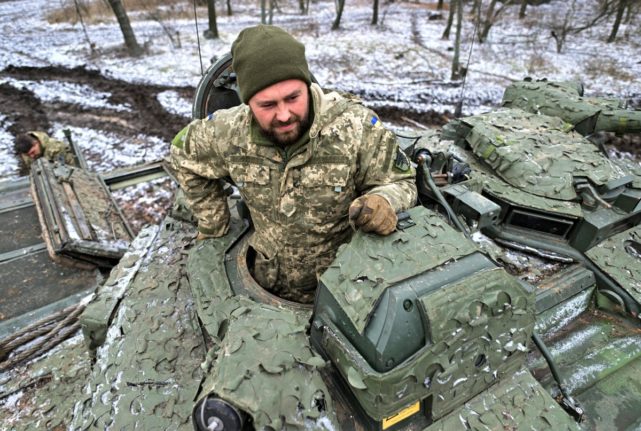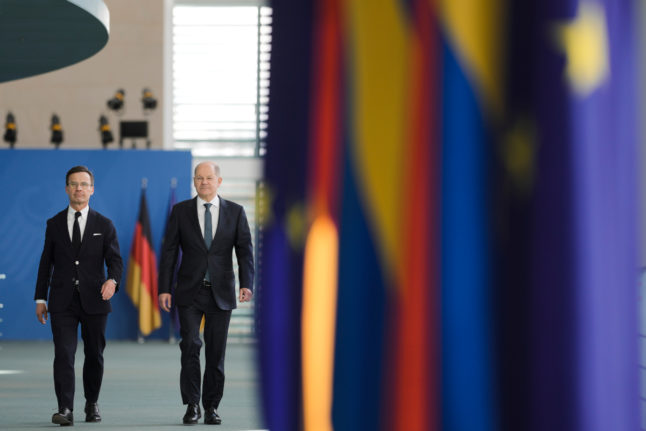While Sweden has contributed troops to international peacekeeping missions, the country has not been directly involved in an armed conflict since the Napoleonic era.
The realities of war are therefore foreign to most Swedes.
“There could be war in Sweden,” Minister for Civil Defence Carl-Oskar Bohlin told an annual defence conference on Sunday, warning Swedes against complacency.
Days later, the sentiment was echoed by the commander of Sweden’s armed forces Micael Byden, who showed pictures of burnt out and bombed houses from Ukraine.
“Do you believe that this could be Sweden?,” Byden asked the audience, later explaining that the question was not a rhetorical one.
READ ALSO: Swedish defence analyst: ‘We should be worried about war in Sweden’
“Russia’s war against Ukraine is a step, not an end goal, for the ambition to establish spheres of influence and tear down the rule-based world order,” he added.
Ending two centuries of neutrality and military non-alignment, Sweden applied to join NATO in May 2022, in the wake of Russia’s invasion of Ukraine, though its bid is currently held up by Turkey and Hungary.
In early December, Stockholm and Washington signed a pact paving the way for US forces to operate in Sweden.
Byden then went on to say that Swedes needed to “mentally prepare for war.”
Anxious children
The statements were widely spread by news outlets and social media.
Subsequently, children’s rights group Bris said it had seen a noticeable uptick in calls to its support hotline from children worried about the prospect of an impending war.
“Many children already have a level of anxiety that was made worse by this news,” Magnus Jagerskog, general secretary at Bris, said in a statement, adding that the pandemic, the war in Ukraine and more recently Gaza had already frightened children.
Store chains have also reported a sharp increase in purchases of items associated with crises, such as emergency radios, jerry cans and camping stoves, resulting in empty shelves in several shops.
The comments have also sparked a debate in Sweden about how plausible a full-scale conflict on Swedish soil is, or whether the warnings amounted to fear-mongering.
“This is a serious situation but it’s also important to be clear that it’s not like war is at the door,” Social Democrat leader and former prime minister Magdalena Andersson told broadcaster TV4.
In an op-ed in the country’s newspaper of reference Dagens Nyheter, left-wing commentator Goran Greider said he believed the commander’s comments revealed “a secret longing to finally test the Swedish fighting forces.”
He also said the real message was more likely: “Give us more money.”
The same paper’s editorial board meanwhile said in a leader some of the critical reactions to the call were “absurd”, and that instead arguing that war was an impossibility was “nonsense”.
In Russia, Sweden’s dire statements have been met with ridicule.
In a post to X, formerly Twitter, the Russian embassy in Stockholm wrote: “Perhaps the Swedish leadership should stop driving its own people towards paranoia?”
‘Dream of war’
Alexey Pushkov, a member of the upper house of Russia’s parliament, commented in a post to Telegram that “sometimes it seems like some Swedish military officers and journalists almost dream of war.”
“They can’t seem to calm down since the defeat at Poltava,” he added, referencing an early 18th century battle between Sweden and Russia in what is now Ukraine.
For Mark Galeotti, a Senior Associate Fellow at the Royal United Services Institute (RUSI), the prospect of Russia turning its sights towards Sweden seems far-fetched.
“I understand that military structures have to think about worst case scenarios. And Russia has demonstrated it to be more viciously aggressive than we had frankly anticipated,” Galeotti told AFP.
“That said, I have to confess I’m sceptical about the odds of any kind of scenario like that emerging,” he continued.
Several factors make it extremely unlikely, Galeotti said, including that “the Russian military, or at least ground forces in particular, has been chewed through” in the war in Ukraine, and rebuilding it will take years.
“The final question is, ‘Why on earth would Putin do it?’,” Galeotti said.
He explained that while Ukraine has a special place in Vladimir Putin’s vision of Russia, he has shown no indications of ambitions to retake the Baltic States — which is often speculated as a scenario that could drag in Sweden.
Galeotti also said it would be hard to imagine Russia wanting to move from an already costly conflict into an even larger one involving NATO countries.



 Please whitelist us to continue reading.
Please whitelist us to continue reading.
A comment from a US friend of Sweden and many dear Swedes who hosted me as an exchange student: the thing that pacifist minded, well meaning people do not “get” is that the way to PREVENT war with an aggressive and opportunistic neighbor like Russia is to PREPARE for war in a very convincing way. Predators do not attack the strong, they seek to take advantage of the weak!
unnecessary fear-mongering from the Swedish government! Our neighbor Finland which has a much more feasible threat did not issue any such warnings